Buddhist Teachings Which May Help with Clinical Depression, Focusing on the Four Noble Truths, Eightfold Path, Five Precepts
Buddha taught the truth of suffering — a truth not unfamiliar to those who suffer from depression. He also taught a simple, non-religious method to treat our suffering. Some of us, who might not be “clinically” depressed — or might have symptoms of depression due to Covid-19 or other stresses — might suffer from some of the symptoms, such as fatigue and insomnia. Buddha’s Four Noble Truths, Eightfold Path and teachings on Bodhichitta and Compassion offer hope and relief.
Editors note: this by Nicholas H. Parker explores the topic, buto does not offer advice. Always consult your health or mental health consultant for advice on treatment.
By Nicholas H. Parker
[Bio below.]

What is Depression?
The Diagnostic and Statistical Manual of Mental Disorders lists the following criteria for depression, of which five or more should occur for a minimum of two weeks:
- Depressed mood occurring throughout most of the day and almost every day for at least two weeks
- Markedly diminished interest or pleasure in all, or almost all, activities throughout most of the day and almost every day
- Significant weight loss when not dieting or weight gain, decrease or increase in appetite nearly every day
- Insomnia or hypersomnia nearly every day
- Psychomotor agitation or retardation nearly every day (e.g. restlessness, feeling down)
- Fatigue or loss of energy nearly every day
- Feelings of worthlessness or excessive or inappropriate guilt nearly every day
- Diminished ability to think or concentrate, or indecisiveness, nearly every day
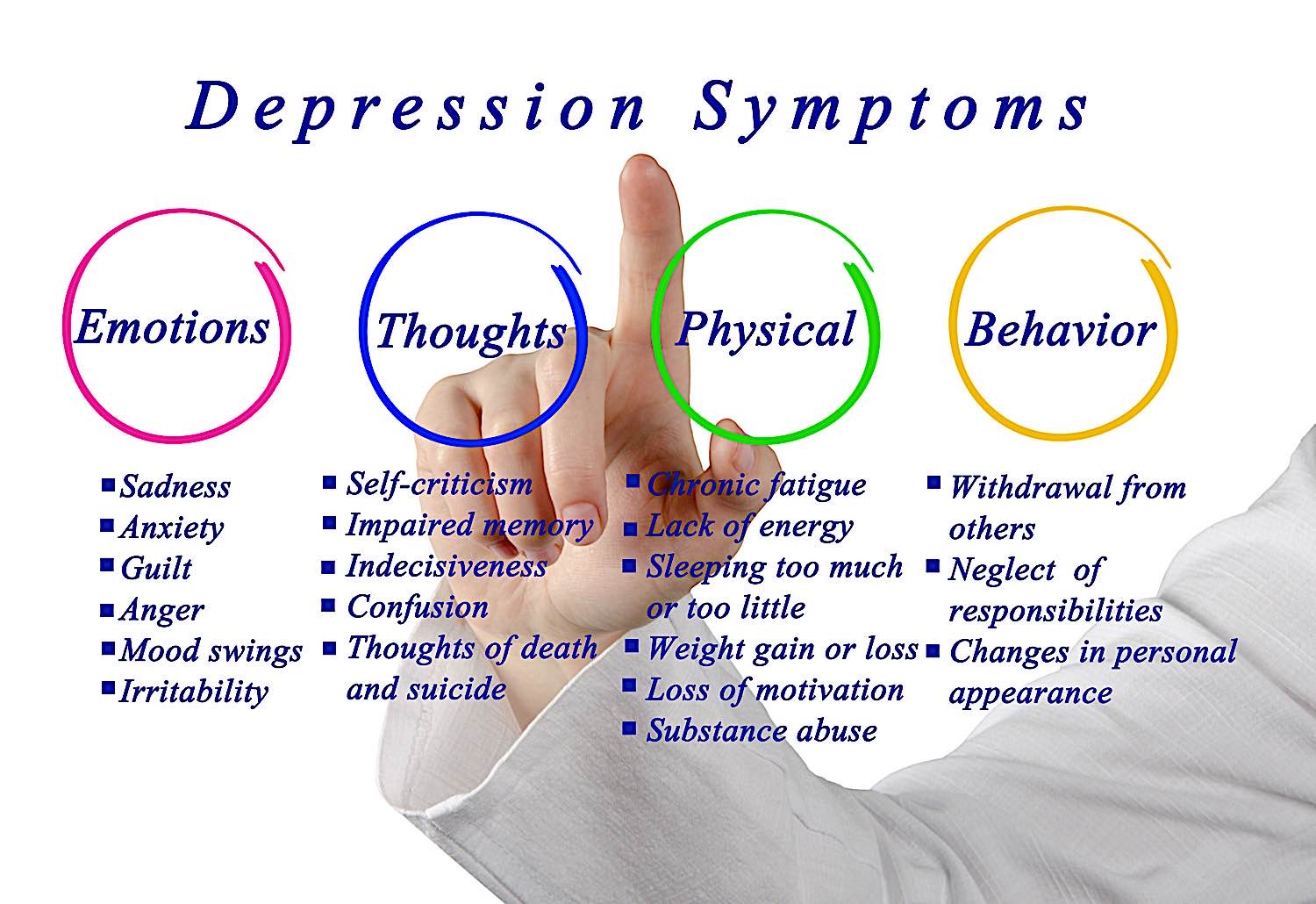
These diagnostic criteria do not fit all cases of depression, however, but are required for a diagnosis (by a medical professional) of Major Depressive Disorder.
NOTE: Always seek help from qualified medical or health practitioners for help with depression.
How Buddhist Philosophy Can Help Depressed People
Buddhism can be treated as a non-religion, which can make many religious individuals more comfortable about learning the philosophies presented by Shakyamuni Buddha over 2500 years ago. Consider the Teachings as “guidelines” that can help one attain a greater sense of self-happiness and an improved sense of control over one’s happiness.

Buddhist Teachings contain three core, universal teachings which are Buddha’s advice for overcoming suffering:
- The Four Noble Truths
- The Eightfold Path
- The Five Precepts
Unlike other religious philosophies where “rules” are presented with strict punishments or threats of rejection, Buddhist philosophy provides positive reinforcing guidelines for a peaceful and happier life for the individual with only the truth of Karma to consider.

Buddhism also teaches meditation methods — which research affirms is helpful in depression including for children [cited studies here>>] — and also methods such as metta and karuna — loving-kindness and compassion, which can be important supports for people suffering from depression — or any form of suffering. Other important teachings that can be reinforcing for people with depression include the Four Immeasurables. [For a feature on the Four Immeasurables, see>>]
- Feature covering research on Buddhist Compassion meditation and its positive benefits to people suffering from depression>>
- Feature covering Metta (loving kindness) meditation and its mental health benefits, based on peer-reviewed research>>
- 10 Benefits of meditation based on peer-reviewed research>>

Karma: Good or Bad?
Many who do not understand Buddhism use the word “karma” but do not understand the meaning. Karma is considered the law of the universe in the sense that “you reap what you sow.” Karma, however, is reinforcing and positive — because you are in control, quite different from notions of fate and “it is out of my control.” [For a feature on the positive aspects of karma, see>>]
Karma for the Buddhist or person who lives by Buddhist philosophy can be considered as: “If I live following the “Eightfold Path,” and other teachings I learn from Buddhism, I will be sowing seeds that reap happiness for myself. If I do not follow these teachings, I am equally responsible for not sowing seeds of happiness which can result in great unhappiness or suffering.”
This is an essential concept to understand because it places the responsibility for one’s happiness in one’s own hands. It can be important for people with Depression to understand that they have more control over their situation than they initially believe.
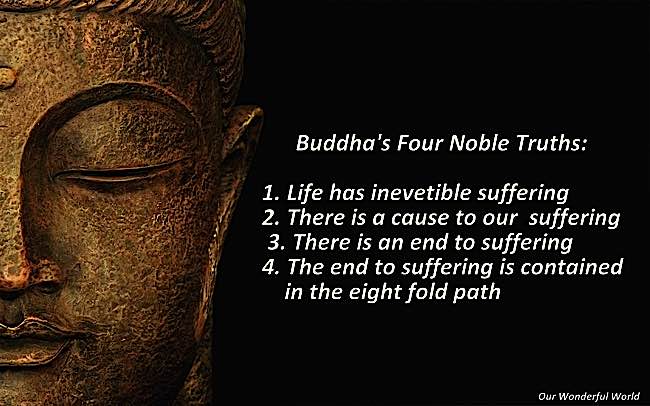
The Four Noble Truths
The Buddha’s first teaching, the Four Noble Truths, explained suffering and its cause and cure — truths that are true for all human beings:
- Life contains suffering
- There is a cause to this suffering
- There is also a cure to the suffering
- The cure to suffering is the “Eightfold Path”

The suffering that the Buddha spoke of was desire and attachments, or more specifically the desire for things one does not or cannot have. The Eightfold Path is a series of eight behavioral and cognitive changes one can make in oneself to free oneself from suffering.
When considering the symptoms of Depression, especially the lack of happiness and pleasure in life and the sense of the individual having no control over their lives, their feelings, their thoughts, or themselves, this teaching can become a valuable tool for any psychologist dealing with this disorder, and possibly other disorders.
Many people with depression find it difficult to pinpoint the causes of their depressed feelings, and some feel that no matter what they do or try things will not get better. These are both thought patterns that can be successfully retrained through the use of Buddhist philosophy.
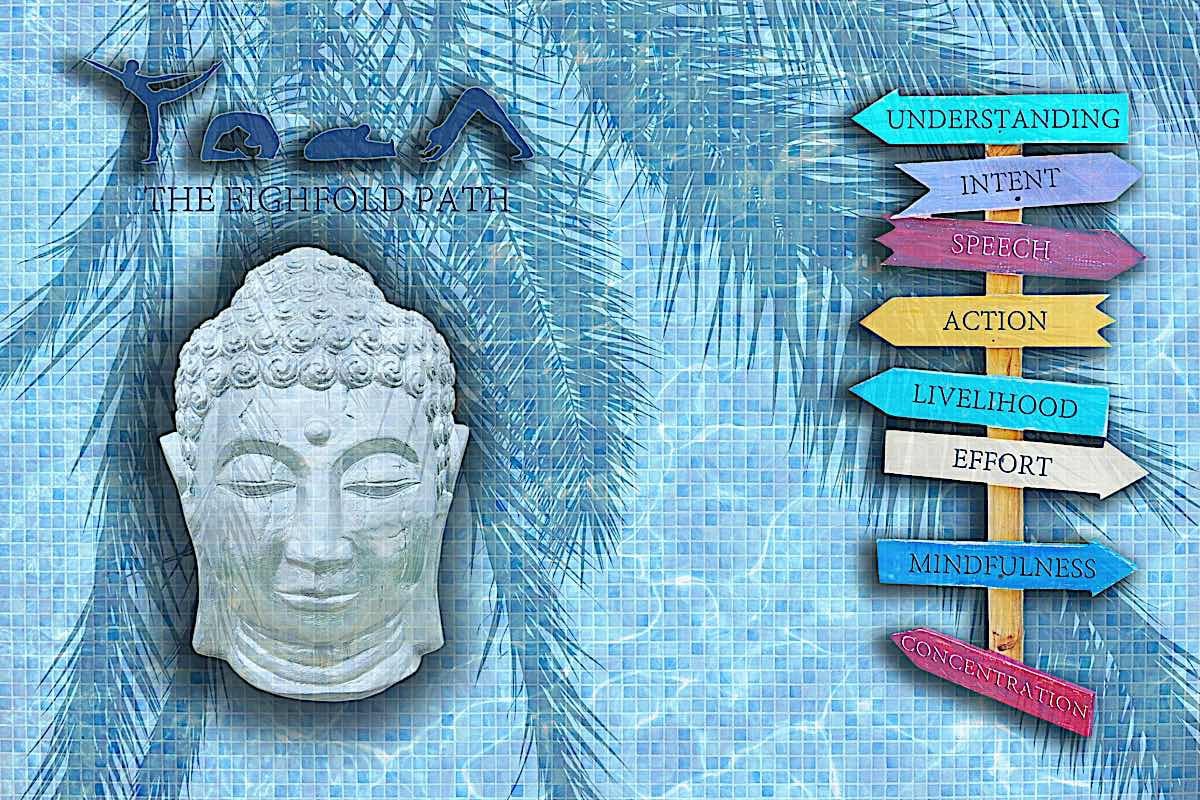
The “Eightfold Path”
The “Eightfold Path” consists of guidelines, a significantly softer word than “commandments,” that if followed lead the individual in a structured, forward-facing motion toward progress, control, and self-responsibility. “The Eightfold Path — which are positive reinforcements, the “Eight Rights” — consists of the following:
- Right Understanding: we should try to learn and understand these teachings
- Right Purpose: we should always try to do what is right
- Right Speech: we should try to always be truthful and kind in the things we say
- Right Conduct: we should behave ourselves
- Right Livelihood: we should earn our living in a way that does not harm others
- Right Endeavor: we should constantly try to become better
- Right Thought: we should cherish our thoughts because our words and actions arise from our thoughts
- Right Meditation: we should remember these teachings daily and strive to apply them to everything we do, think, and feel
These are guidelines. They are not laws putting strict regulations or demands on individuals, and they do not threaten punishments or rejections for failure to comply with one or all, but rather they encourage the individual to try to follow these guidelines as a means of living a better, happier, more fulfilled life.
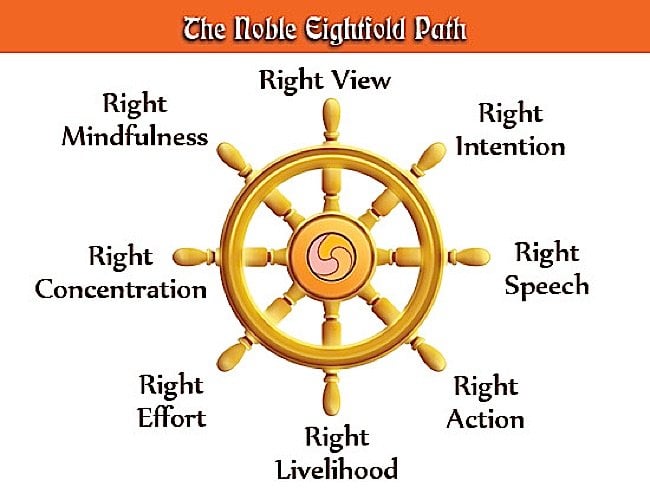
The “Five Precepts”
The “Five Precepts” are closely related to the” Eightfold Path.” “The Eightfold Path” explains what must be done to attain happiness for and within oneself, while the “Five Precepts” are more like traditional rules. By violating the “Five Precepts,” it is impossible to truly be living according to the “Eightfold Path.” “The Five Precepts” are guidance that help us abstain from yielding to our attachments and cravings:
- Abstain from taking life unnecessarily: this is not about becoming a vegetarian; it is about living a compassionate life.
- Abstain from taking things not given.
- Abstain from immoral actions.
- Abstain from the false speech.
- Abstain from intoxication, since a loss of inhibitions allows us to yield to our attachments and cravings.
These seem relatively simple to avoid, which can be a great confidence boost for the Depression sufferer. Gaining a sense of control over one’s happiness and feelings can be empowering and therapeutic, but professional advice should always be sought if problems are particularly distressing or disrupt proper functioning.
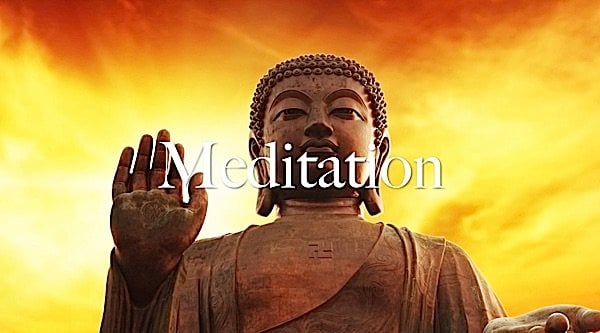
Meditation
Buddha also taught many methods of active meditation, which peer-reviewed studies indicate are helpful for people suffering from depression.
- Feature covering research on Buddhist Compassion meditation and its positive benefits to people suffering from depression>>
- Feature covering Metta (loving kindness) meditation and its mental health benefits, based on peer-reviewed research>>
- 10 Benefits of meditation based on peer-reviewed research>>
- Our special feature section on meditation>>
More articles by this author
Search
Latest Features
Please support the "Spread the Dharma" mission as one of our heroic Dharma Supporting Members, or with a one-time donation.
Please Help Support the “Spread the Dharma” Mission!

Be a part of the noble mission as a supporting member or a patron, or a volunteer contributor of content.
The power of Dharma to help sentient beings, in part, lies in ensuring access to Buddha’s precious Dharma — the mission of Buddha Weekly. We can’t do it without you!
A non-profit association since 2007, Buddha Weekly published many feature articles, videos, and, podcasts. Please consider supporting the mission to preserve and “Spread the Dharma." Your support as either a patron or a supporting member helps defray the high costs of producing quality Dharma content. Thank you! Learn more here, or become one of our super karma heroes on Patreon.
Nicholas Parker
Author | Buddha Weekly
Nicholas H. Parker is a content editor at the essay writer service BuyEssayClub. He used to manage the content team at the company he worked for. Currently, Nicholas writes articles to share his knowledge with others and obtain new skills. Besides, he is highly interested in the web design sphere.













